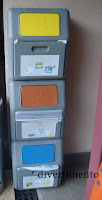Hong Kong generates about 18,000 tonnes of waste a day, half of which will be recycled and another half disposed of in landfills. Another 3,200 tonnes of construction waste also ends up in the landfills every day. The solution probably lies in better waste management and minimizing waste. The first is a government issue and the second is every individual’s responsibility. In fact, it should be everyone’s priority even is garbage disposal facilities are limitless.
The Secretary for the environment Mr Edward Yau pointed out that our current practice of relying on landfills alone in treating waste is not sustainable. “Hong Kong must follow other advanced economies by planning to adopt modern technology such as a waste incineration facility and a food waste processing facility to raise our standards of waste treatment.”
An outlying island, Shek Kwu Chau石鼓洲 (once known as Coffin Island), about six kilometers south of Lantau Island大嶼山, has been selected as the site for a mega waste incinerator. The selection process for the incinerator has been controversial since sites were shortlisted in 2008. In the end, the Shek Kwu chau was selected partly on the basis that it is away from major population centers. However, it will require 16 hectares of land reclamation. In addition, extra power cables will have to be laid in the seabed between the island and Cheung Sha to transmit the electricity generated from the incineration process. In order to mitigate the harm to marine habitats, whose denizens include the protected finless porpoise, the government proposes setting up a 700-hectare marine park between the Soko Islands索罟群島 and Shek Kwu Chau. When completed in 2018, the facility is expected to be able to handle 3,000 tonnes of waste a day.
The practice of waste incineration is not without concerns. Incineration merely reduces the volume of solid waste but it does not dispose of the toxic substances in the waste. Incinerators emit a wide range of pollutants in their stack gases, ashes and other residues. The filters
 used to clean incinerator stack gases produce solid and liquid toxic wastes, which also need to be disposed of somewhere.
used to clean incinerator stack gases produce solid and liquid toxic wastes, which also need to be disposed of somewhere.What can we, as individuals do? Simple:
1. Reduce waste by using less
2. Recycle where possible
3. Buy products made from renewable materials
No comments:
Post a Comment